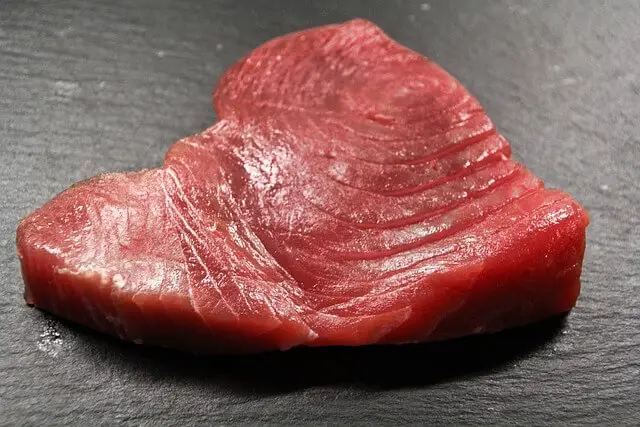Should You Share Tuna With Your Cat?
01.12.2022.
Most people will read this question and automatically say, "Of course cats can eat tuna. tuna is a fish, and cats love fish ". However, tuna is not a good choice for your cat because tuna that's meant for human consumption can cause health issues for cats, especially if given in large amounts or if the cat is fed with tuna frequently.
Can tuna be good for cats?
Tuna can be good for cats once in a while and in small amounts. Tuna has many nutrients including
- vitamin B12
- vitamin D
- good source of protein
- low percent of carbohydrates.
On the other hand, tuna has a lot of unsaturated fat, like omega-3 fatty acids. Although these are a good type of fat and are good for skin and coat health, too much of such fats can cause some serious health problems like pancreatitis or steatitis.
Although tuna has nutritional benefits, it should not be your go-to product to feed your cat regularly because consuming a lot of tuna can lead to serious health complications.
GOOD TO KNOW: Tuna won't harm your cat if given moderately or only as a treat.

RELATED: What Types Of Salmon Can Cats Eat?
Why is tuna not a good choice for cats?
Tuna is not a good choice for cats for several reasons. Tuna does not provide a good balance of nutrients a cat needs, so cats fed regularly with tuna may develop health problems associated with nutrient deficiencies.
Tuna can cause problems with fat inflammation. Canned tuna contains a lot of calories – a few ounces of canned tuna has over 100 calories, so if you feed your cat tuna regularly, it can lead to significant weight gain and many other problems related to obesity, such as diabetes, urinary disease, or arthritis.
Also, canned tuna has a lot of sodium which can cause dehydration and/or high blood pressure. Canned tuna is also high in phosphorous and can lead to kidney disease.
Another problem that might occur is allergies. Just like us humans, cats can also be allergic to fish. And even though people are taught from an early age that cats' favorite food is fish, the reality is that fish allergy in cats is one of the most common ones.
Signs of food allergies in cats, including fish allergies, are
- Itching
- Vomiting
- Diarrhea
- hair loss
- red or swollen skin
- red bumps
If you notice these symptoms after feeding your cat tuna, consider calling your veterinarian because there is a good chance that your cat is allergic to tuna.

RELATED: Can Cats Eat Rice? Is It Good For Diarrhea?
Mercury poisoning
The main reason why tuna should not be given to your can regularly and in large amounts is mercury poisoning. Mercury is a metal found in rocks in the Earth's crust. It is also known as "liquid silver, "which is toxic and harmful to humans and animals.
Mercury poisoning happens when a human and/or animal is exposed to or consumes too much mercury. Fish, in general, contains a lot of mercury, and so does tuna.
Signs of mercury poisoning in cats are these:
- loss of coordination
- loss of balance
- dizziness
- difficulty walking
- tremors or seizures
- involuntary body movement
- rapid, involuntary eye movement
- vision loss
- in rare cases, death.
Mercury toxicity causes neurological and kidney damage that is irreversible.
To be perfectly clear – mercury poisoning is not a frequent occurrence, but it can happen, which is why it is important to know why you should avoid feeding your cat tuna-based foods daily. Better safe than sorry!
RELATED: Can You Share Olives With Your Cat?
How much tuna can I feed my cat?
Tuna should be given to cats in small amounts and rarely. One teaspoon of tuna once or twice a week is more than enough for your cat. Cats need a complete and balanced diet, and 10% or less of a cat's daily calorie intake should come from tuna (or other supplemental treats).
The other 90% of a cat's daily intake of calories should come from proper, balanced cat food that contains essential ingredients that tuna lacks.
Furthermore, tuna has a strong fishy aroma that appeals to cats. If fed frequently with tuna, your cat may become addicted and may refuse to eat other food, so try to use tuna only as an occasional treat.

What types of tuna can I offer my cat?
If you decide to feed your cat tuna from time to time, keep in mind that it should not be raw tuna because raw fish, including tuna, can have Salmonella and Escherichia coli. These can harm your cat, especially if your cat is immunocompromised, very young or very old, pregnant or lactating.
So, the recommendation is to cook tuna before serving it to your cat. Raw fish also contains thiaminase. This enzyme can break down an essential B vitamin and lead to thiamine deficiency, which is very dangerous. Cooking your cat's tuna will kill all the bacteria and parasites and will also destroy the thiaminase.
You can choose tuna tinned in natural water. Never choose tuna tinned in brine (salt water) or olive oil because olive oil is high in fat and may upset your cat's stomach.
However, the safest option is fresh, 100 percent natural, real tuna without any artificial flavors. Make sure that tuna is boneless because small bones in fish can splinter or even puncture your cat's digestive tract or can cause choking. Make sure the tuna is unseasoned too. Seasoning can contain additives that are harmful to cats.
RELATED: Can Cats Drink Milk? Here's What Your Vet Might Advise You
World Cat Finder Team







Share